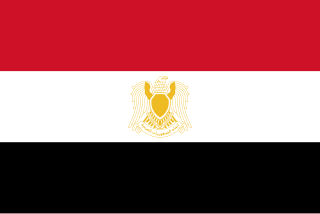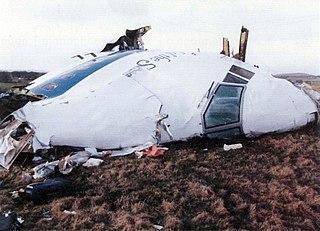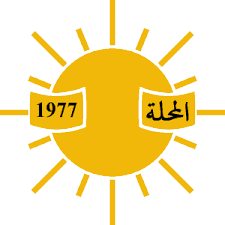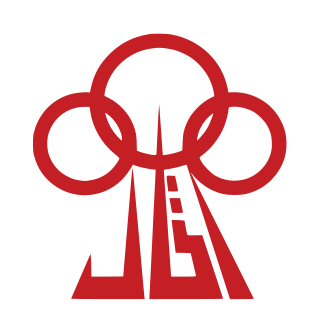| |||||
| Decades: | |||||
|---|---|---|---|---|---|
| See also: | Other events of 1999 List of years in Libya | ||||
| |||||
| Decades: | |||||
|---|---|---|---|---|---|
| See also: | Other events of 1999 List of years in Libya | ||||
April 5, 1999: Libya hands over two suspects--each reportedly linked to Libyan intelligence--to Dutch authorities for trial in the bombing of Pam Am Flight 103.

Libya, officially the State of Libya, is a country in the Maghreb region of North Africa. It borders the Mediterranean Sea to the north, Egypt to the east, Sudan to the southeast, Chad to the south, Niger to the southwest, Algeria to the west, and Tunisia to the northwest, as well as maritime borders with Greece, Italy and Malta to the north. Libya comprises three historical regions: Tripolitania, Fezzan, and Cyrenaica. With an area of almost 1.8 million km2 (700,000 sq mi), it is the fourth-largest country in Africa and the Arab world, and the 16th-largest in the world. Libya claims 32,000 square kilometres of southeastern Algeria, south of the Libyan town of Ghat. The country's official religion is Islam, with 96.6% of the Libyan population being Sunni Muslims. The official language of Libya is Arabic, with vernacular Libyan Arabic being spoken most widely. The majority of Libya's population is Arab. The largest city and capital, Tripoli, is located in northwestern Libya and contains over a million of Libya's seven million people.

The politics of Libya has been in an uncertain state since the collapse of the Libyan Arab Jamahiriya in 2011 and a recent civil war and various jihadists and tribal elements controlling parts of the country.

Tripoli is the capital and largest city of Libya, with a population of about 1.317 million people in 2021. It is located in the northwest of Libya on the edge of the desert, on a point of rocky land projecting into the Mediterranean Sea and forming a bay. It includes the port of Tripoli and the country's largest commercial and manufacturing center. It is also the site of the University of Tripoli.

Muammar Muhammad Abu Minyar al-Gaddafi was a Libyan revolutionary, politician and political theorist who ruled Libya from 1969 until his assassination by rebel forces in 2011. He came to power through a military coup, first becoming Revolutionary Chairman of the Libyan Arab Republic from 1969 to 1977 and then the 'Brotherly Leader' of the Great Socialist People's Libyan Arab Jamahiriya from 1977 to 2011. Initially ideologically committed to Arab nationalism and Nasserism, Gaddafi later ruled according to his own Third International Theory.

Benghazi is the second-most-populous city in Libya as well as the largest city in Cyrenaica, with an estimated population of 1,207,250 in 2020. Located on the Gulf of Sidra in the Mediterranean, Benghazi is also a major seaport.

The Libya national football team represents Libya in men's international association football and it is controlled by the Libyan Football Federation. The team has never qualified for FIFA World Cup but has qualified for editions of the Africa Cup of Nations in 1982, 2006, and 2012. In 1982, the team was both the host and runner-up. In the Arab Cup, Libya finished second in 1964 and 2012, and third in 1966. The team is affiliated with both FIFA and Confederation of African Football (CAF).

Saif al-Islam Muammar al-Gaddafi is a Libyan political figure. He is the second son of the late Libyan leader Muammar Gaddafi and his second wife Safia Farkash. He was a part of his father's inner circle, performing public relations and diplomatic roles on his behalf. He publicly turned down his father's offer of the country's second highest post and held no official government position. According to United States Department of State officials in Tripoli, during his father's reign, he was the second most widely recognized person in Libya, being at times the de facto prime minister, and was mentioned as a possible successor, though he rejected this. An arrest warrant was issued for him on 27 June 2011 by the International Criminal Court (ICC) for charges of crimes against humanity against the Libyan people, for killing and persecuting civilians, under Articles 7(1)(a) and 7(1)(h) of the Rome statute. He denied the charges.

The Federation of Arab Republics was an unsuccessful attempt by Muammar Gaddafi to merge Libya, Egypt and Syria in order to create a unified Arab state. Although approved by a referendum in each country on 1 September 1971, the three countries disagreed on the specific terms of the merger. The federation lasted from 1 January 1972 to 19 November 1977.

Pan Am Flight 103 (PA103/PAA103) was a regularly scheduled Pan Am transatlantic flight from Frankfurt to Detroit via a stopover in London and another in New York City. The transatlantic leg of the route was operated by Clipper Maid of the Seas, a Boeing 747 registered N739PA. Shortly after 19:00 on 21 December 1988, while the aircraft was in flight over the Scottish town of Lockerbie, it was destroyed by a bomb, killing all 243 passengers and 16 crew in what became known as the Lockerbie bombing. Large sections of the aircraft crashed in a residential street in Lockerbie, killing 11 residents. With a total of 270 fatalities, it is the deadliest terrorist attack in the history of the United Kingdom.

Al-Ahly Sports Cultural and Social Club, known as Al-Ahly SCSC, is a Libyan sports club based in Benghazi. Al-Ahly SC has its roots in a political party, the Omar al Mukhtar society.

Al-Tahaddi Sports Club is a Libyan football club based in Benghazi. They are a member of the top division in Libyan football, but were relegated in season 2007/08. Their home stadium is Martyrs of February Stadium.

Sirte, also spelled Sirt, Surt, Sert or Syrte, is a city in Libya. It is located south of the Gulf of Sirte, almost right in the middle between Tripoli and Benghazi. It is famously known for its battles, ethnic groups and loyalty to former Libyan ruler Muammar Gaddafi. Due to developments in the First Libyan Civil War, it was briefly the capital of Libya as Tripoli's successor after the Fall of Tripoli from 1 September to 20 October 2011. The settlement was established in the early 20th century by the Italians, at the site of a 19th-century fortress built by the Ottomans. It grew into a city after World War II.

Khaleej Sirte is a Libyan football club based in Sirte, Libya. They play in the Libyan first division. They play their home matches at the 2 March Stadium in Sirte. The stadium holds around 2,000 people.

Samir Aboud is a retired Libyan footballer who played for Al-Ittihad as a goalkeeper. He was a member of the Libya national team.

Almahalla Sports Club is a Libyan football club based in Tripoli, Libya. The club won two Libyan Premier League titles in a successful period in the late 1990s. The club finished 2nd in 1997, and followed this with two back-to-back titles, in seasons 1997–98 and 1998–99. The club's home strip is orange, and the away strip is black.
Al-Jāmi’a Alasmarya is a public university in the city of Zliten, Libya, specializing in Islamic sciences such as Islamic theology and Islamic jurisprudence. Founded in 1995, the university's academic instruction is conducted from October to March. Statistics from the 1998–1999 academic year indicated a total of 14 teaching staff members and 506 full-time students. The university's academic departments include:

Al-Ittihad Sport, Cultural & Social Club famously known as 'Al-Ittihad, is a professional football club based in Bab Ben Gashier, Tripoli, Libya. They have won the Libyan Premier League 19 times, the Libyan Cup 7 times and the Libyan SuperCup 11 times. Al-ittihad reached the semi-finals of the CAF Confederation Cup in 2010.

Ali Muhammad al-Sallabi, or al-Salabi is a Muslim historian, religious scholar and Islamist politician from Libya. He was arrested by the Gaddafi regime, then left Libya and studied Islam in Saudi Arabia and Sudan during the 1990s. He then studied in Qatar under Yusuf al-Qaradawi and returned to Libya during the 2011 overthrow of Gaddafi and distributed weapons, money, and aid to Islamist groups in the country. His actions were criticized by members of the internationally recognized Libyan government under the National Transitional Council who he in turn criticized as being secular.

The Libyan civil war (2014–2020), also known as the Second Libyan Civil War, was a multilateral civil war which was fought in Libya among a number of armed groups, but mainly the House of Representatives (HoR) and the Government of National Accord (GNA), for six years from 2014 to 2020.
The following lists events that happened in 1991 in Libya.